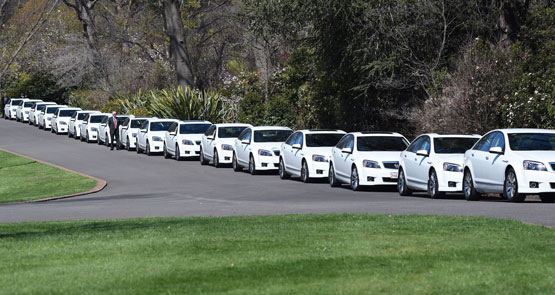
Comcars line up outside Government House in Canberra
Rather than drastically reducing the access to travel entitlements and other benefits granted to parliamentarians, the government will rename them “work expenses”, in a move to change how the public views the system.
Last year, following the Bronwyn Bishop “Choppergate” scandal, then-prime minister Tony Abbott announced a review into the parliamentary entitlements system by an independent panel including former speaker Harry Jenkins and former opposition leader Brendan Nelson.
Unlike the Belcher review into entitlements released just over five years ago, the government has decided to immediately back and implement changes recommended by the review, released by Finance Minister Mathias Cormann today.
The latest review doesn’t go as far as the Belcher review in recommending a massive reduction in entitlements; rather it suggests a shift in the way parliamentarians claim entitlements and better ways of reporting the issue to the public.
The review recommends renaming entitlements and benefits as “work expenses”, as that term “more clearly conveys the legitimate purpose of the activities supported”, and allows expenses to be claimed on what is defined as “parliamentary business”.
Parliamentary business is divided into three categories: electorate duties, parliamentary duties and party political duties. Under the changes, parliamentarians would be able to claim expenses related to going to Parliament for sittings or committee hearings, attending functions or events as a parliamentarian both in and out of their electorates, and attending party political meetings and conferences.
It does not include events solely for political fundraisers, preselection and membership events, or events for the personal or commercial benefit of a parliamentarian. But a meeting that also has a small fundraising component would be able to be claimed as an expense under the changes.
Parliamentarians will be required to consider value for money when making decisions on work expenses — no more choppers from Melbourne to Geelong — and should be prepared to justify how their expenses represent value for money.
In fact, one recommendation specifically points out that “in the absence of compelling reasons, helicopters cannot be chartered to cover short distances”.
MPs will still be able to claim business class fares on domestic flights and family travel for three return flights per dependent child, but full fare economy price will be used to determine the funds allocated to these claims. Family holidays will not be permitted under interstate family reunion travel, but family members will be allowed to travel with parliamentarians on “legitimate — not contrived — parliamentary business”.
Parliamentarians will also be required to detail why they are claiming flight and travel expenses, and this information will be disclosed to the public.
Travel for former parliamentarians who don’t qualify for the Life Gold Pass will get a cut from six return flights to Canberra each six months to just three.
To improve transparency around entitlements, the report has recommended the government publish expenses data set on data.gov.au, and it should be moved to quarterly reporting rather than biannual reporting. Once a new IT system is developed by the Department of Finance, the report recommends reports be released monthly.








According to the definition of Democracy – as well as its name – it means ‘the people rule’. According to current practice, to be a member of parliament is an exercise in ego tripping. You squeeze the tax payer for all you can get by means proper and not, you drive around Canberra in BMWs if Corollas would do.
Yes, life of a parliamentarian is tough, but you chose it and it does not change the fact that as a servant of the people you are expected to be one of them – not above them.